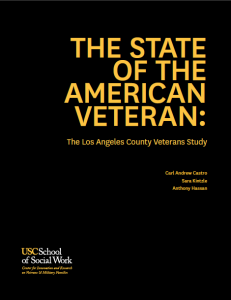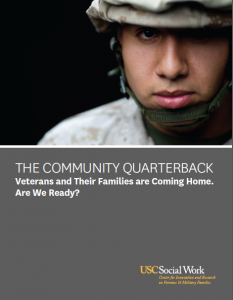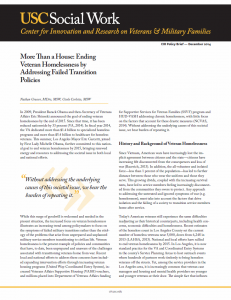New to the Collaborative
Why collaborate?
Veterans are often unaware of available services and how to access them. They are uncertain of eligibility requirements and unsure whether said services will be helpful for their specific problems. Further, while service providers generally have the best of intentions with regard to serving the veteran population, they are often unaware of the scope and complexity of the challenges faced by military-impacted individuals.
These factors, coupled with a general lack of collaboration between service providers, stymie efforts to improve veteran outcomes and obstruct the capacity of the veteran service community to fulfill its objectives. Without sharing information about best practices and cutting-edge research, organizations are neglecting the benefit of a significant body of knowledge that could improve their service provision capacity.
The needs of individual agencies should not drive policy and practice in the veteran space, but rather the needs of veterans should act as a compass. Community stakeholders from all sectors should form a coordinated effort to meet those needs.
What to expect?
The Los Angeles Veterans Collaborative meets every second Wednesday of the month from 10 a.m. – 12 p.m. at the Los Angeles Athletic Club, 431 W. 7th St., 3rd Floor. While the collaborative breaks into their individual working groups, new members will be provided with an overview of the LAVC structure, purpose, mission and working groups. All information on the presentation is featured below.
Download the ‘New to the Collaborative’ presentation.
Los Angeles County Veterans Study Findings
Other Resources
September 2014
“The State of the American Veteran: The Los Angeles County Veterans Study” by the USC School of Social Work’s Center for Innovation and Research on Veterans & Military Families outlines the findings of a survey conducted fall 2013 of more than 1,350 veterans living in Los Angeles County. The first comprehensive study of a large urban military population, which also includes follow-up focus groups with 72 veterans, explored numerous areas, such as transition challenges, employment and finances, housing, health and access to veterans services.
Key among the findings is that many service members leaving the military and returning to LA County are not prepared for the transition home and have a range of needs that cannot be easily provided by a single organization.
Are we ready? Is our community ready? Is our country ready to honor the moral obligation to ensure that its veterans and their families receive the services promised to them when they enlisted and to completely address any injury, illness or other disparity created as a result of their service?
We know that communities that successfully support their military-impacted populations are those that engage their entire citizenry in the unique challenges facing veterans transitioning home. Therefore, we need to create a coordinated community-based approach that brings together diverse sets of resources and identifies new opportunities across public and private sectors–a community quarterback.
There appears to be no end in sight to the ongoing stressors for military personnel and their families. The United States has been continuously at war for more than a decade with the conflicts in Iraq and Afghanistan the longest in our nation’s history. Persistent instabilities in the Middle East, North Africa and Asia are likely to keep American forces engaged in combat operations for many years to come. The demanding operational tempo of two challenging combat theaters coupled with the nature of the nation’s all-volunteer force, and the expanded involvement of military reservists has meant that many service members have been deployed multiple times since 2001, which in turn has brought family and community issues to the forefront and into the realm of veterans issues. It is apparent that psychological and personal stresses for service members and their families are more prevalent and widespread than previously understood.
Nathan Graeser, MDiv, MSW
Gisele Corletto, MSW
In this policy brief, the authors discuss tackling the veteran homelessness problem holistically. More than providing housing, veteran policies must address the underlying causes of homelessness, which in many cases is a lack of preparation and awareness of the full spectrum of challenges associated with transitioning from military to civilian life.







